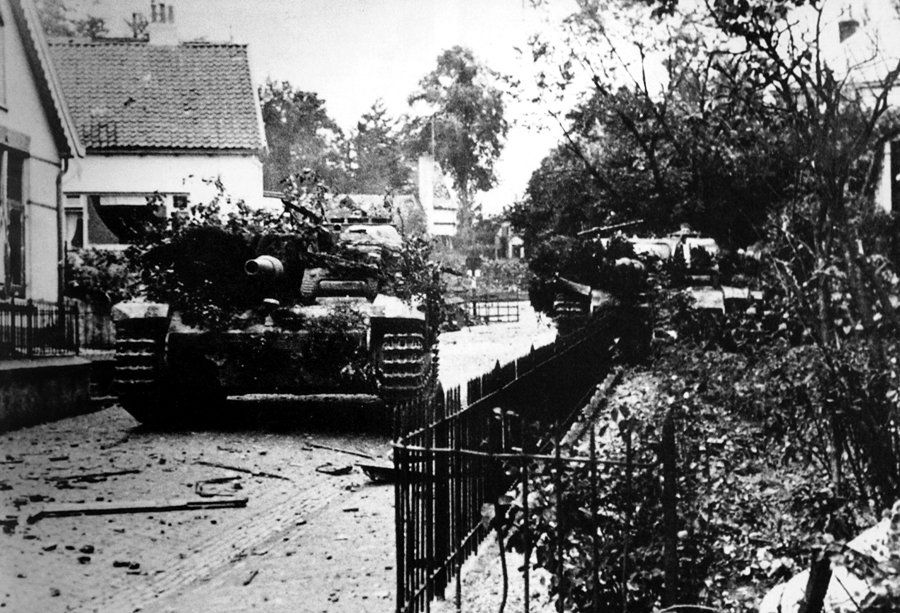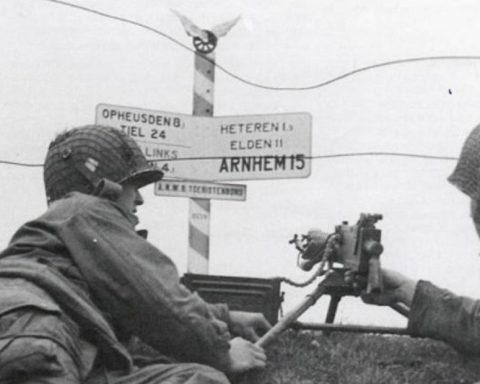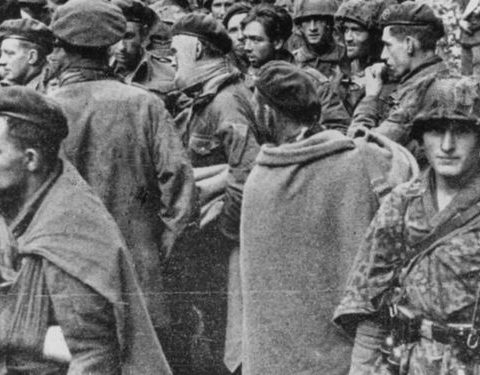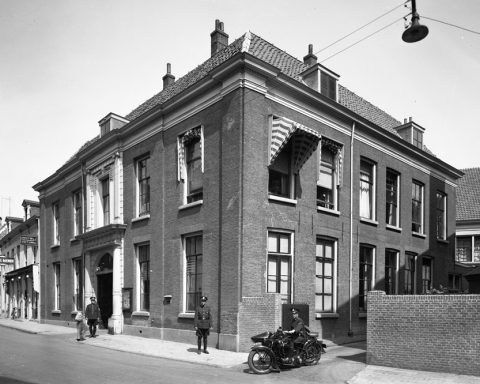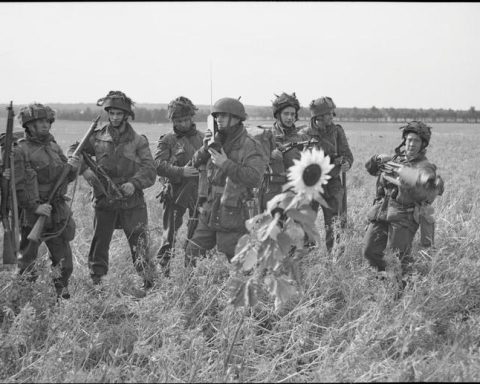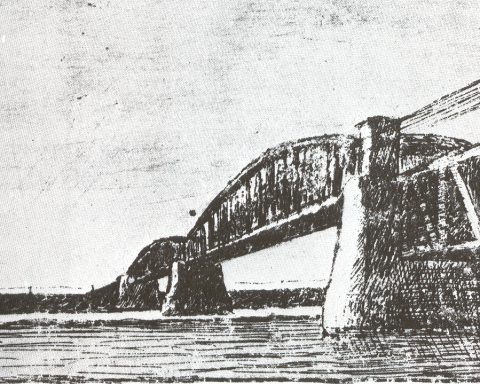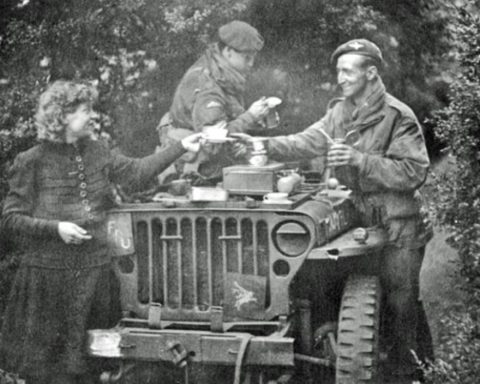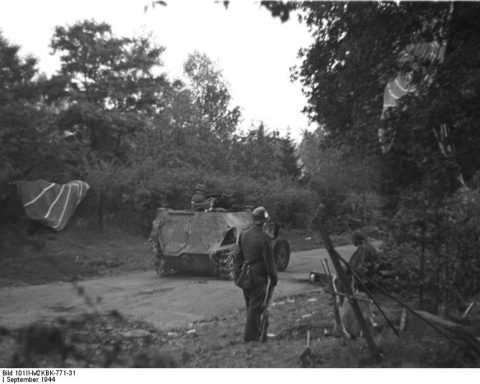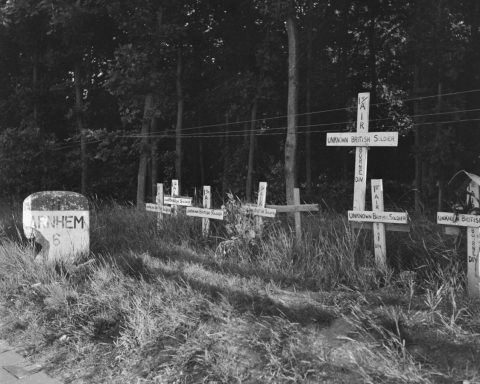The remnants of the four battalions that had tried to break through to the Rhine Bridge via the Utrechtseweg and the Onderlangs on Tuesday, September 19, had withdrawn in a chaotic retreat to Oosterbeek.
Under the leadership of Major Dickie Lonsdale, they formed a defensive position a few hundred meters east of the Oude Kerk on the Benedendorpseweg. While the British were still organizing there on the morning of Wednesday, September 20, they were confronted with a heavy German attack with tanks and infantry.
The Germans had stopped the day before at the beginning of the evening at the Utrechtseweg and at the Benedendorpseweg near the railway line. From the Benedendorpseweg, the Germans advanced towards Oosterbeek at the end of the morning of September 20 with the intention of cutting off the British from the Rhine.
In addition to tanks, the Germans also used flamethrowers. At one point this led to panic among a group of soldiers from the South Staffords.
“They came running down the road. Most of them had no weapons, but I also saw two walking among them and throwing their rifles away. A jeep drove straight through this group and an officer jumped out and shot his revolver into the air. I couldn’t hear what he said, but it must have been something along the lines of “back off, you wimps.” They turned around and he had an NCO march them back.”
Unlike the day before, when the British could only attack the tanks with PIAT anti-tank guns, they now also had anti-tank guns at their disposal.
Sergeant John Baskeyfield of the South Staffords was in command of a 6 pound anti-tank gun. He managed to take out two tanks with his cannon. Baskeyfield always waited until a tank came within a hundred meters before he fired at the tank.
The gun crew had been disabled by a German hit. Baskeyfield himself was seriously wounded in the leg, but he continued to load and fire. After his anti-tank gun was destroyed by a German hit, he crawled to another anti-tank gun whose crew had also been knocked out. Baskeyfield manned this single-handedly and took out another Tiger tank with a few shots.
A supporting German tank then probably fired a shell at Baskeyfield’s gun, killing him. Baskeyfield was posthumously awarded a Victoria Cross : the highest British military award.
Another Briton who distinguished himself that day was Major Robert Cain. At one point, German self-propelled artillery had hidden on the other side of a house. Major Robert Cain fired PIAT grenades over the roof at a sharp angle of elevation as if he had a mortar. Lieutenant Ian Meikle attempted to guide Cain to his target from the roof of the house. Meikle was killed when a German shell hit the chimney. The incessant shelling perforated Cain’s eardrums.
Two German tanks that appeared afterwards were hit by Cain with his PIAT anti-tank rifle. To ensure that the tank he had hit had really been neutralized, he fired again. However, the PIAT grenade exploded in the launcher and Cain was taken to the first aid station.
Cain feared he was blind, but after a while his sight returned. Cain decided he was “not wounded enough” and returned to the front line, where he operated an anti-tank gun and took out another tank. Robert Cain was also awarded a Victoria Cross.
As a result of the courageous and fanatical defense of the British at the Benedendorpseweg, the Germans withdrew at the end of the afternoon. They had lost many tanks as well as many soldiers in the attack on the Lonsdale Force.
But Lonsdale’s mixed force was also greatly weakened by the heavy German attacks that day. The Lonsdale Force was therefore withdrawn a few hundred meters back, to just in front of the Oude Kerk on the Benedendorpseweg.
Because the Germans had also withdrawn, many of the soldiers were able to rest for the first time since they landed. Major Lonsdale gave his famous speech from the pulpit in the Oude Kerk. He himself had a bandage around his head and his arm was in a sling.
Lonsdale praised the quality of the German troops, but said that the Germans did not have the quality that they themselves had. Lonsdale praised the men for the recent fighting and said they were able to freshen up before taking up new positions in the houses near the church.
Lonsdale’s speech led to a significant increase in the morale of the soldiers. The Germans had thrown the British back, but the British paratroopers were far from defeated.

